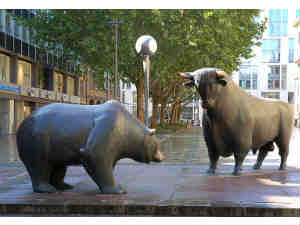Five important factors that impact stock market movements

Market follows two different trends i.e. upward and downward which are also known as 'Bulls n Bears phase' and the stream from one trend to another creates profits and losses. Up moves are referred to as Bull and downturns are bear.
What are the factors that impact stock market trends?
There are five factors which impact stock market trends and traders use them as triggers to take decisive direction. They watch these factors closely and predict a possible market direction.
Economic Indicators
Stock markets react on various economic factors, such as interest rates, inflation, GDP growth, money supply, unemployment rate, change in fiscal policies, Index of Industrial Production (IIP) numbers, etc.
All these factors are directly or indirectly related to each other. Any change in these indicators will have an impact on stock markets. It may impact any particular stock, particular sector or stock market as a whole.
These economic indicators play a major role driving the stock market trend. For example, inflation – it has a great impact on stock market. Government usually rises interest rates during high inflation, which in turn increases company's borrowing cost and that results into low profitability. And, during high inflation, short-term financial instruments like short-term bonds perform well, so investors move their money from stock market to such instruments.
Global markets
If other economies are performing quite well compared to our economy, investors prefer investing into those economies. For example, currently US and Europe are struggling hard to come out of crisis, so investors are shying off investing in their economies because they prefer investing in economy with strong GDP growth rate. Investors and traders usually track global markets because that directly or indirectly impact domestic markets. For example, IT companies, they have good revenues from abroad. If global markets are not performing well, that may impact their sales.
Foreign Institutional Investors (FIIs)
Foreign capital is free and unpredictable and is always on the look out of profits. Flls frequently move market trends, and those swings can be expected to bring severe price fluctuations resulting in increasing volatility. Good performance of domestic companies and strong economic growth of the country can attract large number of FIIs. More FII inflows drive markets up and vice versa.
Speculative activities
Speculators are usually risk takers. They are rational investors and they predict trends by looking at the fundamental factors of the stock. They invest when the prices are too low and sell when prices are too high. When investors become speculators they are purchasing a stock with the sole purpose of selling it to someone else at a higher price. They can easily lift and move the prices down by any point of time.
Supply and Demand
Supply and Demand forces play a vital role in stock market. Price of stock changes as supply or demand changes.
Demand is positively related to price of the stock i.e. if demand is more than supply, prices will rise.
Supply is inversely related to the stock i.e. if supply increases beyond current demand, prices will fall. Stocks fluctuate on a short and long-term scale, creating trends.
The threat of supply drying up at current prices forces buyers to buy at higher and higher prices, creating large price increases. If a large group of sellers were to enter the market, this would increase the supply of stock available and would likely push prices lower.
(Your feedback is valuable to us. Mail at [email protected])
OneIndia Money
































